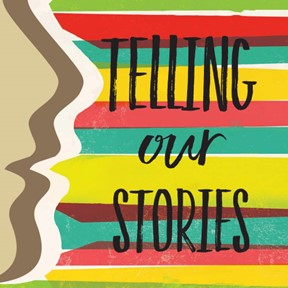A Case for Storytelling
A Message from Pastor Dave Denoon and Pastoral Assistant Halley Kim
Liturgist/Storytellers encouraged…
Dave
Not long after the death of Marilyn Davis, who recruited announcers and liturgists for a decade or more, Pastoral Assistant Halley Kim was handed the Liturgist-recruitment reins. This was because of her role as “stories before God” correspondent. She has been the primary staff member working with liturgists in designing the time of confession in our worship service (Ritual of Approach). The heart of this article is our invitation to you to volunteer, some Sunday soon, to serve as a liturgist. And, although storytelling is not required as part of that role, we encourage you to consider it. Here’s why.
Halley and I developed and started this practice of ours, after reading two enlightening works by the Rev. Molly Baskette – Real Good Church: How our church came back from the dead, and yours can, too (Cleveland: Pilgrim Press, 2014) and Standing Naked Before God: The Art of Public Confession (2015). As I mentioned in a sermon, about a year ago, Rev. Baskette wrote these books upon the phenomenal success of her pastorate at First Congregational Church, Somerville, Massachusetts, in which she took that community from 35 adults and 6 children on a Sunday to about 130 weekly adults year-round and close to 100 children.
The single most effective adjustment Somerville made to their life together was what Rev. Baskette calls, “public confession,” in which individuals leading worship prepare the congregation for their unison confession, by confessing themselves. Our church has approached this process as a congregation with measurable success, but also some shyness and guardedness.
Still, newcomers especially have been moved by stories they have heard, and not a few of our new members have professed that these confessions have motivated them to want to join the church (and a couple of them have told their own stories!).
Halley has composed the next few paragraphs, to share why she also finds this new practice of ours to be so important and vital.
Halley
I deeply appreciate that progressive Christianity is gentle and kind. We do not hammer people over the head here with the toxic idea that they are unworthy or depraved. And thank goodness! As a former evangelical, I’ve had quite enough of being told how wretched I am. No, I am not wretched; I am beloved. I am created in the image of God, as are you.
We are complex beings, though. Humanity is capable of immense good and terrible evil. Or, in a more likely point of view, as I’ve joked, anyone who is married or has children has surely had to apologize for something!
I’m also aware of the truth of an observation Rev. Baskette made in her book, Standing Naked Before God:
One reason some fundamentalist sects have grown, sometimes exponentially, when kinder, easier churches have declined and died, is because they have asked their followers to do hard things… For decades in the mainline Protestant church we have settled for something less than total truthfulness. We have not asked each other to do hard things, like give generously, or serve sacrificially, or reveal our wounds. But if we don’t ask each other, and ourselves, to do these hard things, we will never find out what we’re made of.
She’s right. In the evangelical world I was constantly challenged, told to interrogate my motives and to consider how I might have missed the mark. This was all done to excess, and with the harmful premise that of course I was perpetuating sinful patterns in my life and relationships because I was inherently bad. We, on the other hand, are not going to communicate to our people that either we or they are inherently bad, not now, not ever.
Still, I think it’s helpful to share with others and before God some of the self-reflection we have done, what we have at times found to have been wrong with us and how we have, with God’s help or by God’s grace, made it right.
Maybe you’ve slipped up interpersonally, or by unintentional participation in a societal ill (i.e. racism, misogyny, etc.), or even internally engaged in derogatory self-talk. You might have been stressed, or triggered, or needed education around a certain topic, but you realized, this was not a referendum on who you were. And, because impact matters more than intent, you worked toward repairing what was wrong. Others deserve to know and to learn from you, and you will benefit by the vulnerability you will have risked and the authentic self you will have presented.
I hope you will tell your story, give it a try. Tell your story to deepen our community and make it more genuine. Tell your story to insist that church be a safe place to bring your full self. Tell your story because it communicates to newcomers that we don’t take ourselves too seriously. Tell your story because honesty about our shadowy stuff is what returns us to glorious light.
To volunteer to be a liturgist, either as a storyteller or not, please contact Halley at [email protected]. For inspiration about what to tell as your story, flip back to “Worship Notes” and see what the subject matter for your Sunday will be.

